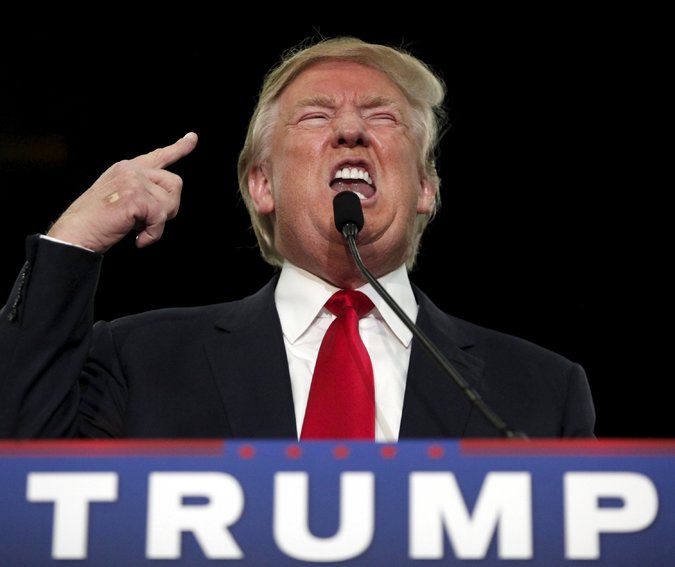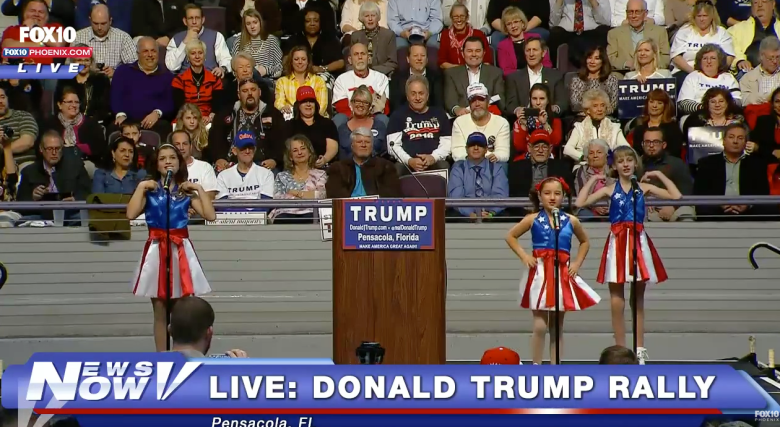
I regularly identify Donald Trump as a fascist, or a neo-fascist (by which I simply mean “modern day fascist”). Some may think that I am engaging in hyperbole, or political rhetoric, but I am in earnest. Donald Trump is undeniably, and demonstrably, a fascist.
I say that because Trump’s campaign for president bears all of the traditional hallmarks of fascism, so much so that Mussolini’s descendants probably should sue him for copyright infringement.
Here’s what I mean:
In my opinion, the single biggest common denominator among would-be fascist leaders is the narrative that only this one man can save the nation. That he alone, the strong man, uniquely has the qualities required to meet the crisis of the day. It is implied that without this one individual, national salvation is not possible, because the democratic (lowercase “d”) leaders are “weak,” “stupid,” or some other diminishing adjective. The fascist leader tells us that traditional political models are insufficient for the present national emergency, and that only he can restore the nation to its previous glory (or, “Make America Great Again”), while focusing his followers on what he defines as present national humiliation and an ongoing state of victimhood.
He tells his followers that to save the people, they must reject the weakness of the past and embrace a radical new future.
The fascist leader must quickly identify both internal and external enemies for his followers to fear and hate. The far more important of the two is the demonized internal enemy, as they become identified as the insidious “other” living among us, who must be driven out if the nation is to survive. For Adolf Hitler, obviously, this was German Jews. For Donald Trump it is illegal aliens, and more specifically, Mexicans. Trump has identified his scapegoat group thusly: “They’re bringing drugs. They’re bringing crime. They’re rapists.” He has promised to hunt down and remove 12 million of the “other” and to turn America into a fortress to keep these frightening people from ever getting back in.
Of course, Trump has also identified Muslims as a target “other” group, and he seeks to build a legal wall around America to protect the nation from the threat they pose. Whether or not these people ever actually represent anything near the threat that is portrayed is beyond the point. The leader’s followers must have an evil enemy upon which to project their rage, which keeps them unified toward a common goal; the “other” supplies them with their enemy.
The fascist leader hates the free press, which he sees as a threat to his power. Hitler and Mussolini shut down opposition newspapers immediately upon assuming control, and soon their nations’ media was in lock step behind them. Trump has repeatedly expressed hatred and disdain for those in American media who challenge him, and he has said that he will change libel law to allow the free press to be dragged into court if they write unflattering articles about him. While we all assume that such court cases would fail, one only need to imagine a budget-strapped newspaper considering an anti-Trump piece, knowing that Trump’s army of lawyers could cost them hundreds of thousands of dollars in defense fees. It would soon be cost-prohibitive to report negatively on Trump. Trump could also easily deny press credentials and access to “unfriendly” media, which would make editors think twice before angering him unnecessarily, and just as Hitler and Mussolini did, the free press would be effectively muzzled.
It should be noted that Trump’s rallies are already shining examples of his attitude toward the free press. In every other political campaign ever run in America, reporters and photographers are allowed to move at will, speaking with, and often videotaping the event. But not at Trump’s events. The media is literally caged in a steel pen, guarded by Secret Service agents so that they cannot escape, while Trump mocks them from the stage. Recently, a photographer was choke-slammed to the ground at a Trump rally because he attempted to leave his metal pen. Trump has said that the editor of the National Review “should not be allowed on TV,” and I’m sure if Trump had his way, others would be faced with similar bans from speaking out against him. This is what the future of the free press looks like under Trumponian Fascism.
The fascist leader hates democratic (again, the lowercase “d”) processes, and strives to rule without them. For example, upon taking power, Hitler used the burning of the German national assembly as an excuse to declare a national emergency, and for the next twelve years ruled by decree. In the USA, we have a similar mechanism called an “executive order.” Donald Trump has already stated that, should Congress prove slow or indecisive with approving his legislation, he would consider ruling by executive order. His words: “I won’t refuse it. I’m going to do a lot of things.” Just last night Trump threatened that if Republican Speaker of the House Paul Ryan attempted to oppose him, Ryan would “pay a big price.”
The fascist leader sees violence as a useful tool in suppressing dissent. Trump’s rallies, where silent African-American protestors are forcibly removed, and where the media is intimidated and physically assaulted, may just be the beginning. So what does Trump think about political repression in general? Here are his thoughts about how the Chinese crushed democracy protests in 1989: “When the students poured into Tiananmen Square, the Chinese government almost blew it. They were vicious, they were horrible, but they put it down with strength. That shows you the power of strength.”
But what about political expression here in America? Well, when anti-Trump tee shirts first appeared online, Trump had his lawyers send them an email: “Mr. Trump considers this to be a very serious matter and has authorized our legal team to take all necessary and appropriate actions to bring an immediate halt…”
And what about the internet, where freedom of expression runs amok, Mr. Trump? “I would certainly be open to closing areas of it.”
Fascism 101, folks.
Now, lastly, let’s look at how the fascist leader presents himself in public. The fascist leader must always project strength and power to his followers. He must also communicate that he is above and separated from them, because he alone is their savior. Mussolini did this by speaking to Italian fascists from balconies; while Hitler always spoke from behind a raised lectern. While other presidential candidates often speak at rallies without barriers between them and their audiences, so as to project a sense of oneness and community, Trump is definitely a lectern guy. Even though he never uses prepared notes, once he’s ready to speak, he is always behind a lectern, because the lectern projects power and separation.
The fascist leader is also always louder than other speakers, because, as the strong man, he cannot be seen to lose a war of words with those he has portrayed as weaklings. Thus, he is prone to shouting and fits of public rage, because rage is interpreted as power by his followers, and the words of the fascists’ opponents must be subjugated, just as are the individuals.
Finally, the fascist leader must always be seen as the head of a mass movement, which is why he speaks so often at large public assemblies. Small group appearances work against his use of the lectern and his voice amplification technique, they also reduce the fascist leader by making him appear to be more common, which undermines his strong man image.
So, now, I hope you can see why it can be clearly concluded that America is witnessing the rise of what I like to call Trumponian Fascism. I think that it is also instructive to note that while Germany’s fascist leader rose from the military, and Italy’s from the newspapers, America’s fascist has risen from big business, which is probably what we should have expected all along.

Trump Youth Singing Propaganda Song At Rally
Actual lyrics, sung by Trump Youth dancers at Trump rally:
“Enemies of freedom face the music
C’mon boys, take them down
President Donald Trump knows how to make America great
Deal from strength or get crushed every time”









